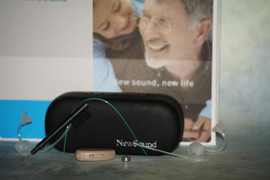A Guide to Resources and Support for People with Hearing Loss
Posted by DR Paul on May 27, 2023
Hearing loss is a condition that affects millions of people worldwide and can have a significant impact on one’s life. The good news is that there is a wide range of resources and support available for people with hearing loss, ranging from technological advances in hearing aids to support groups and advocacy organizations. In this blog post, we’ll explore some of the best resources and support for those with hearing loss, including tools for managing hearing aids, educational materials for individuals and families, and organizations that support those with hearing loss.
Technology for Hearing Aids:
Technology has advanced so much that hearing aids have been made more user-friendly and are currently more discreet than ever before. Hearing aids have become smaller, more powerful, and with more advanced features. Some have sensors that automatically adjust sound based on the environment. Some have a feature that allows users to control settings through a smartphone app. There are also Hearing Aid Assistance Programs in various countries. They offer substantial discounts to people who can not afford them.
Educational Materials and Services:
Because of the increasing number of people with hearing loss, there has been a rise in the demand for educational materials on the various types of hearing loss, the range of hearing aids available, and the impact that hearing loss can have on an individual's life. The Hearing Loss Association of America has a wealth of educational resources available on its website, from articles and webinars to a guide to audiograms. Additionally, most physicians and audiologists provide counselling and guidance on managing life with hearing loss.
Support Groups:
As with any challenge, having a support network can make a big difference in coping with hearing loss. Many people form or join support groups that specialize in hearing loss. The Hearing Loss Association of America, as well as other organizations, have local chapters throughout the United States and around the world. Support groups can be a source of information, encouragement, and friendship for those who are experiencing hearing loss.
Advocacy Groups and Legal Assistance:
Advocacy groups are organizations that support the needs of people with hearing loss by advocating for policy changes, organizing rallies and events, and supporting scientific research. There are various organizations that offer legal assistance to those who are experiencing hearing loss and feel that they have been discriminated against. The Americans with Disabilities Act offers legal protection to workers who have been affected by hearing loss.
Accessibility Tools and Communication Options:
There are several tools and communication options that can help ease the challenges faced by people with hearing loss. Live captioning during remote meetings has become a tool for accessible conversations for people with hearing loss. Sign language interpretation is another means of communication and accessibility for the deaf and hard of hearing community. Proper education on how to use these tools is important so that we can prevent discrimination among people with hearing loss.
Conclusion:
In conclusion, technology, educational materials, support groups, advocacy groups and accessibility tools such as live-captioning and sign language interpretation are all great resources for people with hearing loss. At the same time, it’s essential to educate ourselves on the various services and opportunities out there to get the full benefits of the help and support they give. With these critical resources in hand, individuals with hearing loss can better manage their condition and avoid the negative effects of isolation or discrimination. With the right tools and resources available, people with hearing loss can lead healthy, happy, and fulfilling lives.










